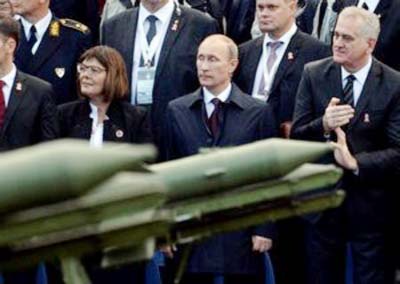
Reuters, Belgrade :Serbia is performing a delicate balancing act between its European aspirations, partnership with NATO and its centuries-old religious, ethnic and political alliance with Russia.Belgrade is being wooed by the West which has sought to bring it into the fold since the fall of Slobodan Milosevic in 2000. Serbia is now a European Union membership candidate and the bloc is its top trade partner and benefactor.Belgrade is also quietly moving toward NATO despite the reservations of most Serbians but it is wary of damaging its loudly proclaimed friendship with Russia that wants to boost its influence in the region and which is hostile to the military alliance.”Serbia cannot entirely turn to NATO, it will maintain the maximum level of cooperation with it, without changing its (membership) status,” said Genady Sysoev, Balkan correspondent for Russia’s Kommersant newspaper and an expert on Moscow’s policy in the region.”Serbia cannot turn to Russia because … no Serbian leadership would risk losing Western investment and aid.”Serbia is one of the few Balkan countries not in the 28-member NATO which is hugely unpopular among Serbs after its 1999 bombing campaign to drive Serbian forces out of Kosovo.Alliance peacekeepers are also still deployed in Kosovo, Serbia’s former southern province, whose independence in 2008 has not been accepted by Belgrade.But in 2006 Serbia, which adopted military neutrality, joined NATO’s Partnership for Peace program and in 2015 Belgrade signed the Individual Partnership Action Plan – the highest rung of cooperation between the alliance and a country not aspiring to join.”Serbia has demonstrated great enthusiasm for the partnership with NATO, relations between NATO and Serbia will be developing, benefits for Serbia will increase,” Gordon Duguid, Deputy Chief of the United States mission to Serbia, was quoted by the Tanjug news agency as saying on June 28.Serbia is however, highly emotional about non-NATO member Russia, an ally that, for example, prevented Kosovo from becoming a member of the United Nations, at Belgrade’s request.Serbia also shares Slavic and Orthodox Christian traditions with Russia and depends on it for energy. The largest Serbian oil company, Naftna Industrija Srbije, is majority-owned by Russia’s Gazprom and its gas imports come from Russia.As a token of good relations, Belgrade in 2012 also allowed Moscow to set up a base for rapid response in emergency situations such as forest fires and floods in Serbia’s southern city of Nis.The Serbian military is loosely based on Russian technology, a legacy of former Yugoslavia’s ties with the Soviet Union.

